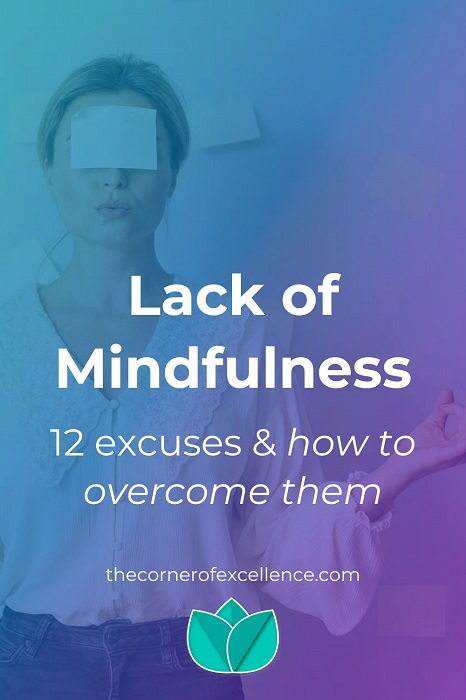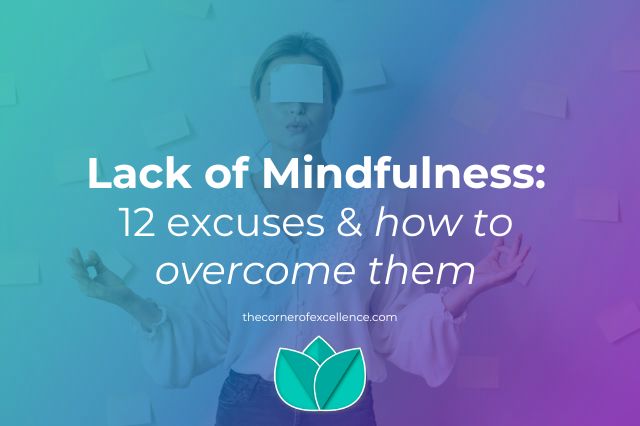Nervousness, being easily distracted, lack of focus, patience or self-compassion are some signs of a lack of mindfulness. Nowadays we are attracted by so many stimuli that our ability to focus and keep still is diminished. We feel the need to constantly entertain ourselves and keep busy.
However, it is the conscious pauses that make us more productive. It is the active breaks that relieve our stress and allow us to regain energy. There are many reasons to incorporate mindfulness into your life. But humans are masters at making excuses for not spending enough time doing what is good for us. Let us look at some excuses for a lack of mindfulness and how you can overcome them, if you want to.
1. Lack of mindfulness due to lack of time
Do you know the expression “lack of time does not exist, it is lack of interest”? We all have our burden of responsibilities. But I invite you to think for a moment about the people around you.
Can you think of someone who always says they do not have time? From what you know, do they really have that much to do? Then think about whether you know another person who seems to do a lot of different activities and you might wonder how they manage. Well, both of them, and you, have the same 24 hours a day.
The question is: what do we give importance to? What is a priority for us? Therefore, what do we spend our time on? Maybe you have a hard time reserving half an hour for yourself. But how about five minutes? Or a minute several times a day?
2. I am too busy to add anything else
Suppose you have reviewed your priorities and what you do in your day-to-day life. Still, it is very difficult for you to incorporate another activity. However, mindfulness can not only benefit us through formal practice. There are many ways to pay more attention to the present moment.
I suggest that you take advantage of everyday activities that you already do to give them your full attention. When you shower or brush your teeth, instead of thinking about everything that awaits you that day, focus mindfully on the activity.
When you eat breakfast, lunch or dinner, pay full attention to the food. Appreciate its look, smell, and texture. Focus on each bite. When you cook, really focus on the different steps you take to prepare the dish. The next time you find yourself in a traffic jam, take the opportunity to pay attention to your breathing.
As you can see, a lack of mindfulness is rather due to not taking advantage of all the opportunities that present themselves to us throughout the day.
3. I cannot leave my mind blank
Lack of mindfulness is not the same as not knowing how to leave your mind blank. Letting your mind go blank is something that can be achieved sometimes. But it is a myth that it is a goal of mindfulness. It is just about paying attention to the present moment.
The goal is to be mindful of our body, mind and what surrounds us. But the matter is doing so with acceptance and without judgment. When thoughts go through your mind, the idea is not to get hooked on them. That is, do not brood over them but let them be. Accept that they are there just like the thousands of thoughts that go through your mind every day.
4. I do not know how to do it
Maybe you think that your lack of mindfulness is because you do not know how to do it. If you want to learn to meditate, there are many courses and resources to learn and practice.
However, mindfulness is much more than meditation. It is a lifestyle of being more present. As I mentioned before, you can practice mindfulness with many everyday activities. You can also take advantage of the breaks you take throughout the day to practice mindfulness breathing exercises. Besides, you actually already know how to do it. When something interests and excites you, you do not have trouble paying full attention, don’t you?
5. I have tried it and it does not work
After knowing the benefits, you may have tried meditating once. But it takes practice to get into the habit of being still and quiet for a while, just with yourself.
Mindfulness needs to be learned and practiced over and over again like any other new thing. You will not attend one Spanish class and pretend to know everything right away; nor will you expect to get the benefits of sport practicing only once a year.
We dedicate time each day to our body hygiene. But we usually have a harder time doing the same with our mental hygiene. However, practicing mindfulness will quickly become a habit if you take time each day, even if it is just a few minutes.
6. I do not do it right
You may think that when you try to practice mindfulness, you are not doing it right. Many of us are not used to being still for a while without doing anything. Even with practice, each day the experience will be different.
It is worth remembering the words of Jon Kabat-Zinn. He said that there is no correct way to practice mindfulness. It is better to face each moment with freshness. Pay full attention to the moment. Then let it go and delve into the next moment.
Live and accept your own experience. Do not worry about what you are supposed to feel or think. Rather, trust the process and your experience. Accept possible feelings of insecurity. Also get rid of the habit of needing some authority to validate your experience.
7. I am too stressed for mindfulness
Maybe you think your lack of mindfulness is due to being too stressed. However, it is precisely in times of stress that it can be most beneficial to you.
Stress is often due to brooding over concerns of the past or future or thinking about everything we need to do. So taking a moment to bring your attention to the present moment is a relief.
However, do not set your expectations too high regarding practice. Our mind is a master at trying to distract us and find excuses. When you spend a moment with yourself, you may feel bored, restless, impatient or annoyed for example. We are used to a world with multiple stimuli and distractions. Therefore, concentrating on just one thing for a few minutes can sometimes be difficult.
Still, just take a few seconds or minutes to pay attention to your breathing. Or take a short walk and be mindful about your steps. You can also have a drink or a snack and pay attention to its appearance, smell and taste. Be aware of the sensation in your mouth and how it travels down your esophagus.
8. Mindfulness requires a lot of time
Your lack of mindfulness may be because you think it takes a long time. But we have already seen several examples of how to be mindful throughout the day even with everyday activities.
Of course it would be ideal to spend half an hour or an hour a day just being present. But you will notice the benefits, such as less stress or greater ability to concentrate, even if you only spend a few minutes.
You can start by incorporating brief moments of mindfulness into your morning routine or when you take a break from work. As you notice the benefits, you are likely to seek more time to experience the sense of calm that mindfulness produces.
9. I have nowhere to meditate
Not all of us have a room or a space for us where we can be alone for a while. Although it would be ideal, try to be flexible and creative. Can you agree with your family to leave you alone for a while throughout the day? If it is not at home, do you have any green space nearby to go to? Can you join a group that meets to meditate?
If you really cannot find a place, remember that mindfulness is more than just meditating. There are many ways and many types of exercises to practice mindfulness.
10. I find it difficult to keep still
I have mentioned before that many of us are not used to staying still. But as you have already seen throughout this post, it is not an excuse for a lack of mindfulness.
You can choose more active exercises with which to practice mindfulness. Taking a mindful walk paying attention to the movement of your body is a great option. Relaxing stretching exercises whilst paying attention to your body sensations and your breathing is another option. Doing the mountain or the starfish are also somewhat more active mindfulness exercises. And, of course, remember the option of practicing mindfulness with everyday activities.
11. I am afraid to be alone with my thoughts
You may worry that, while you are still and mindful, unwanted thoughts and emotions might arise. However, mindfulness teaches you two things. On the one hand, it teaches you that you are not your thoughts and that you should not identify with them. On the other hand, it shows you to accept your emotions and thoughts.
Being mindful of them can help you identify unhealthy thoughts that have become a bad habit. It can help you recognise what emotions and fears they are trying to hide. Perhaps you do not want to face certain feelings of insecurity, loneliness, desire for recognition or grief for example.
But the more we avoid fear, pain or worry, the more they will grow. Remember that mindfulness is accepting our situation as it is. As you acquire practice and learn to tolerate your thoughts and emotions, you will be able to reduce the force of what is hurting you.
12. I have no discipline to keep practicing
The last excuse for a lack of mindfulness may be that you do not have discipline. Perhaps you have a hard time creating new habits and maintaining them. However, you can use a series of tricks that facilitate the incorporation of a new habit.
First of all, do not put too much pressure on yourself. If your expectations are too high, it will be easier not to meet them. And then you get the perfect excuse of “I have no discipline.”
The second step is to give importance to mindfulness. If you really make it a priority, it will be easier for you to find time for it. Remember point 1. There are people who do not find time for anything and others find it for many things. The difference is in the priorities they set themselves and how they organise their life.
If for whatever reason you skip mindfulness practice one day, do not take it as an excuse to quit for good. Do not beat yourself up about it, but be self-compassionate. Just get back into the “practice arenaâ€.
Do you lack of mindfulness?
Do you know the benefits of mindfulness? Would you like to practice it more? Then, which are your excuses for not dedicating more time to it?

Sharing is caring!





One Response
A great post with lots of useful insights and tips. Thanks for sharing it.